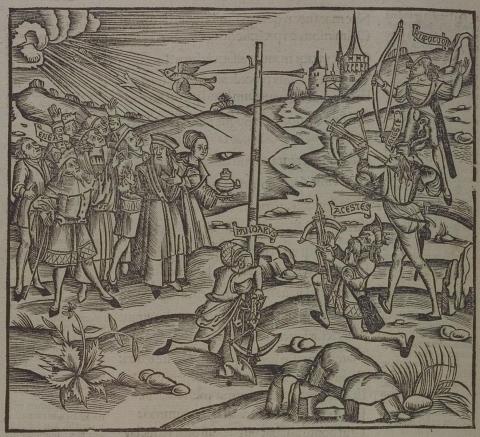CORE VOCABULARY
Aenēās, ae, m.: 1. A Trojan chief, son of Venus and Anchises, and hero of the Aeneid, 1.92. 2. Aenēās Silvius, one of the Alban kings, 6.769.
sagitta, ae, f.: an arrow, 1.187, et al.
invītō, āvī, ātus, 1, a.: to ask as a guest; to invite, 8.178; encourage, incite, 5.292.
manus, ūs, f.: the hand, 1.487; freq.; (meton.), action, movement of the hand; work, art, handiwork, 3.486; prowess, heroic deed, action, 2.434; force, violence, 2.645; a collection of persons; a band, crew, troop; an army, 2.29; forces, 5.623; multitude, 6.660; pl., manūs, workmen, 11.329; dare manūs, to yield, 11.558; extrēma manus, the finishing hand or touch, 7.572.
mālus, ī, m.: a standing pole; a mast, 5.487, et al.
Serestus, ī, m.: a companion of Aeneas, 1.611, et al.
ērigō, rēxī, rēctus, 3, a.: to raise up, rear, erect, 4.495; cast upward, 3.423. (ex and regō)
trāiciō, iēcī, iectus, 3, a. and n.: to throw across, over; pass over, cross, 6.536; pierce, 2.273; transfix, 1.355; p., trāiectus, a, um, drawn or passed through, 5.488; transfixed, pierced, 9.419. (trāns and iaciō)
fūnis, is, m.: a rope, 2.239, et al.; cord, string, 5.488.
columba, ae, f.: a pigeon, dove, 2.516.
suspendō, pendī, pēnsus, 3, a.: to hang up, 6.859; hang, 1.318; p., suspēnsus, a, um, suspended, scarcely touching the ground or water, 7.810; hanging, 8.190; as adj., in suspense, uncertain, doubtful, in doubt, 6.722; anxious, 2.729; filled with awe, 3.372.
dēiciō, iēcī, iectus, 3, a.: to cast down, 6.581; strike down, slay, 11.642; drive down, 4.152; shoot or bring down, 5.542; deprive of, 3.317; dēicere vultum, to cast down the eyes, 3.320; (pass.), dēicī, to be disheartened, dismayed, 10.858. (dē and iaciō)
aereus, a, um: adj. (aes), made of copper or bronze; bronze, brazen (see def. of aes), 1.448; brazen beaked, 5.198; of the copper or bronze plates or scales of a corselet, 10.313.
galea, ae, f.: a helmet, either of leather or of metal, 3.468, et al.
Hyrtacidēs, ae, m.: the son of Hyrtacus. 1. Hippocoön, 5.492. 2. Nisus, 9.177.
exeō, īvī or iī, itus, īre, irreg. n. and a.: to go out or forth, 1.306; come out, 5.492; overflow, burst forth, 2.497; avoid, elude, 5.438.
Hippocoōn, ontis, m.: companion of Aeneas, 5.492.
nāvālis, e: adj. (nāvis), pertaining to ships; naval, 5.493; subst., nāvālia, ium, n., dock, docks, dockyard, naval arsenal, 4.593; naval equipments, 11.329.
Mnestheus, and Menestheus, eī and eos, m.: Mnestheus, one of the Trojan chiefs under Aeneas, 5.117; 10.129, et al.
certāmen, inis, n.: a striving, a struggle; effort, 5.197; combat, emulation, strife, 3.128; battle, war, 8.639; contest, game, 5.286. (certō)
viridis, e: adj. (vireō), verdant, green, 3.24; green wood-, 7.677; fresh, blooming, 5.295; vigorous, 6.304.
ēvinciō, vinxī, vinctus, 4, a.: to bind round; crown, wreathe, 5.269; bind, 5.364.
olīva, ae, f.: an olive tree, 6.230; olive branch, olive wreath, 5.309.
Eurytiōn, ōnis, m.: brother of the Lycian archer Pandarus, and follower of Aeneas, 5.495.
ō: (interj. expressing joy, grief, astonishment, desire, or indignation), O! oh! ah! w. voc., 2.281, et al.; w. sī and the subj., oh that, 11.415; sometimes placed after the word to which it relates, 2.281.
Pandarus, ī, m.: Pandarus, a Mysian chief, allied with the Trojans, who broke the truce at Troy by wounding Menelaus with his arrow, 5.496, et al.
iubeō, iussī (fut. perf. iussō for iusserō, 11.467), iussus, 2, a.: to order, request, usually w. inf., freq.; bid, 2.3; ask, invite, 1.708; will, wish, desire, 3.261; direct, enjoin, admonish, 3.697; persuade, advise, 2.37; to clear by command, 10.444; w. subj., 10.53.
cōnfundō, fūdī, fūsus, 3, a.: to pour together; mingle with, 3.696; trouble, confuse, 2.736; disturb, interrupt, violate, 5.496.
foedus, eris, n.: a treaty, league, alliance, freq., truce, 5.496; side or party, 12.658; covenant, contract, 4.339; laws of hospitality, hospitality, 10.91; pledge, love, 4.520; law, term, condition, rule, 1.62. (rel. to fīdō, trust)
torqueō, torsī, tortus, 2, a.: to wind, turn, twist, 4.575; roll along, 6.551; whirl, hurl, 3.208; shoot, 5.497; cast, dash, 1.108; direct, 4.220; turn away, 6.547; turn, cause to revolve, 4.269; control, 12.180; p., tortus, a, um, whirled, whirling, impetuous, 7.567.
Achīvī, ōrum or um: the Greeks, the Achaeans 2.102.
subsīdō, sēdī, sessus, 3, n. and a.: to sit or settle down, 12.492; to sink down, fall, subside, 5.820; remain, 5.498; subside, remain below, be lost or disappear, 12.836; (w. acc.), to lie in wait for, remain, or watch for the spoils of, 11.268.
Acestēs, ae, m.: Acestes or Segestus, the son of Crimisus, a Sicilian river god, and Egesta or Segesta, a Trojan woman, 1.195.
flexus, a, um: crooked, 5.500. (flectō)
incurvō, āvī, ātus, 1, a.: to bend in; bend, 5.500.
arcus, ūs, m.: a bow, 5.500, et al.; the rainbow, 5.88.
dēprōmō, prōmpsī, prōmptus, 3, a.: to draw forth, 5.501.
pharetra, ae, f.: a quiver, 1.323, et al.
nervus, ī, m.: a nerve; sinew, tendon, 10.341; bow-string, 5.502; string of the lyre, 9.776.
strīdeō, 2, n., and strīdō, strīdī, 3: to produce a grating or shrill sound; to creak, 1.449; gurgle, 4.689; rustle, 1.397; whiz, roar, 1.102; hiss, 8.420; twang, 5.502.
dīverberō, no perf., ātus, 1, a.: to strike asunder, cleave, cut, 5.503.
veniō, vēnī, ventus: to come, freq.; come forth; approach, 6.755; rise, appear, 1.353; dawn, 10.241; to present one's self or itself, 5.344; descend, spring from, 5.373; impers., ventum est, we, they came or have come, 4.151.
īnfīgō, fīxī, fīxus, 3, a.: to fasten in or upon, w. dat. or abl., 1.45, et al; thrust, 12.721; p., īnfīxus, a, um, thrust deeply, deep, 4.689.
intremō, uī, 3, n.: to tremble, 5.505; quake, 3.581.
exterreō, uī, itus, 2, a.: to frighten; alarm, startle, terrify, 3.307; flutter in terror, 5.505; p., exterritus, a, um, startled; roused, 4.571.
penna (pinna), ae, f.: a feather, 12.750; wing, pinion, 3.258; in the form pinna, a pinnacle, battlement, palisade, 7.159.
āles, itis (gen. pl. sometimes alituum, 8.27): adj. (āla), winged, swift, 5.861, et al.; subst. c., a bird, 1.394; an owl, 12.862.

